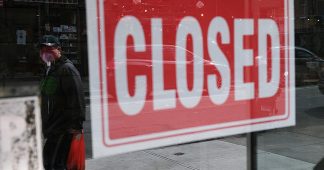By Anthony Torres and Alex Lantier
3 August 2020
Eurostat economic figures for the second quarter of 2020 show that Europe saw its deepest and most sudden economic collapse in history.
Already before the COVID-19 pandemic, Europe was sinking into recession. In the fourth quarter of 2019, Germany was stagnant, while France (-0.1 percent) and Italy (-0.4 percent) were falling. The collapse in business confidence due to the pandemic and the effects of lock-down measures have now triggered an unprecedented economic disintegration.
Workers, the self-employed and small businesses are seeing a historic collapse in living standards. Eurostat indicated on July 31 that the Gross Domestic Product (GDP) fell by 12.1 percent in the euro zone and 11.9 percent in the European Union (EU). In the first quarter, the contraction was 3.6 percent and 3.2 percent, respectively. In Germany, Europe’s leading economic power, GDP fell by 10.1 percent; the contraction from April to July was 10.7 percent in Austria and 12.2 percent in Belgium.
Italy, which was severely hit by the pandemic, saw its economy fall 12.4 percent. Jack Allen-Reynolds of Capital Economics said: “Italian GDP has in fact fallen to its level from the beginning of the 1990s.” Elsewhere, the collapse was even steeper. France, Portugal and Spain saw falls of 13.8, 14.1 and 18.5 percent, respectively. According to currently available projections, the British economy likely contracted approximately 15 percent in the second quarter.
If European economic activity remains at similar levels for the rest of 2020, Europe will see an economic crash more severe than any year in the Great Depression of the 1930s.
Leading European corporations have suffered record losses in virtually every branch of industry and are now dependent on multi-billion-euro, state-funded bailouts. Among Europe’s major automakers, Volkswagen reported having lost €1.4 billion as its revenues collapsed by 23 percent, while the Renault-Nissan alliance suffered a devastating €7.3 billion loss. European aerospace firm Airbus saw a net loss of €1.9 billion.
Major European oil firms were devastated by the collapse of oil prices driven by the halt in travel and industrial activity during the lock-downs. Total and Royal Dutch Shell reported net losses of €7 billion and $18.1 billion, respectively. The net profits of French luxury conglomerate Hermès collapsed by 55 percent in the first half of the year.
Major airlines also face disaster. Air France-KLM published its profit report on Thursday, reporting an 83 percent collapse in its overall revenues. Lufthansa, for its part, had already reported a €2.1 billion loss in the first trimester. IAG Group, which owns British Airways, as well as Aer Lingus and Iberia, reported a net loss of €4.2 billion in the first half of the year.
Millions of workers have no longer been employed during the pandemic, and companies relied massively on state funding to pay their part-time wages. As of last month, 9.3 million workers depended on such programs in Britain, 4.5 million in France (down from 8.8 million in April), 6.9 million in Germany, and 3.7 million in Spain. Italy, for its part, spent approximately €5 billion monthly on such part-time work arrangements.
An explosive class confrontation is brewing between the working class and the financial aristocracy in Europe and internationally. Having advocated a politically criminal policy of “herd immunity” on COVID-19, calling to end lock-downs and let workers catch the deadly virus to try to acquire immunity, the ruling elite is now proceeding with as much contempt for workers’ jobs as for their health and lives. While grabbing trillions of euros in public funds for the banks and corporations, they are moving to slash wages and jobs.
While the European Central Bank (ECB) has agreed to a €1.25 trillion bailout of European banks, the EU has agreed to a €750 billion bailout package for European states and corporations. These vast sums of public money are being plunged into stocks and the financial markets to bail out the super-rich. However, state authorities and the trade union bureaucracies are not demanding that billionaire investors and major corporations that receive these massive sums in state aid give any guarantees that they will not sack workers or cut their pay.
Instead, dozens of bailed-out corporations are announcing mass layoffs, while governments across Europe and worldwide move to slash social spending and living standards. Already in Britain, plans have gone into effect to cut furlough programs by October, and payments in Spain are to be cut from 70 to 35 percent of workers’ wages by the fall. Yesterday, the IG Metall union announced that it expected 300,000 metalworking jobs to be destroyed in Germany.
This social onslaught is proceeding with the complicity of the European trade unions, which are actively helping to design these policies with state officials and corporate management. The German and French unions, in fact, signed a joint statement hailing the EU bailout designed by German Chancellor Angela Merkel and French President Emmanuel Macron.
The ruling elite is pursuing the most parasitic, selfish and reckless policy since the French feudal aristocracy refused to pay any taxes to resolve the fiscal crisis before the 1789 revolution.
What is being prepared is a new, international eruption of the class struggle outside the corrupt framework of the unions. The most explosive situation is emerging in America, where support payments for workers are being suspended this month, threatening tens of millions with hunger and eviction. In Europe, the EU Commission has estimated that unemployment will reach 9.5 percent in the euro zone, with southern European countries the hardest hit. They foresee unemployment rising to over 20 percent in Greece and Spain, 11.8 percent in Italy, and 10.1 percent in France.
These horrific figures mean the loss of millions of jobs and the bankruptcy of thousands of small businesses, in order to bail out a corrupt financial elite that is plundering massive amounts of public money. It must be added, however, that these estimates are likely over-optimistic. They depend on employers agreeing to rehire tens of millions of workers currently paid by the state, due to a quick recovery in economic output.
Thus, ING economist Bert Colijn told Le Monde: “This recession is like no other. We have never seen such figures, such a dizzying collapse linked to the pandemic and the lock-down, which will be followed inevitably by a rapid upswing which we will see in the statistics for the third quarter.”
Such a scenario seems increasingly unlikely in the longer term, however. The ending of lock-downs has led to a collapse of social distancing measures and now a rapid resurgence of the virus across Europe. The number of daily new cases has risen to 1,000 in France and soon in Germany, over 600 in Belgium, and 3,000 in Spain. Thus, since late June, when the daily number of new cases was at its lowest, just after the lock-down, this number has gone up by a factor of two in France and Germany, seven in Belgium, and 10 in Spain.
While EU states insist they will not impose further lock-downs or only impose regional lock-downs, a policy that in fact accelerates the spread of the disease, their dithering may ultimately leave them no choice but to take drastic measures if the virus explodes out of control. Given the failure of EU governments to implement proper testing and tracing facilities and boost health care spending, such a scenario—entailing a new, drastic contraction in economic activity—is a growing possibility.
Already, the Spanish government re-imposed a “voluntary” lock-down in Barcelona, affecting over 4 million people in an economically vital region of Spain.
Workers cannot stop the plundering of society by the financial aristocracy through nationally-oriented protests organized by the trade unions, which are at the same time negotiating austerity with EU banks and governments. As the pandemic exposes the bankruptcy of the capitalist system, it is essential for workers across Europe to take up a political struggle for state power against the EU. Their best allies are workers around the world fighting against austerity and reactionary back-to-work orders.
The trillions of euros spent to bail out the wealthy must go to fighting COVID-19, safeguarding the salaries of workers and the self-employed, while major corporations relying on public bailout funds are nationalized across Europe and beyond, to be run under workers control as public utilities. This is essential to ensure the health and safety of workers despite the horrific impact of the COVID-19 pandemic and the resulting blow to the economy











